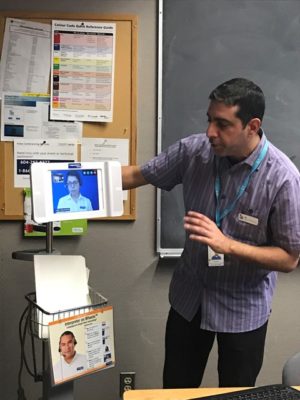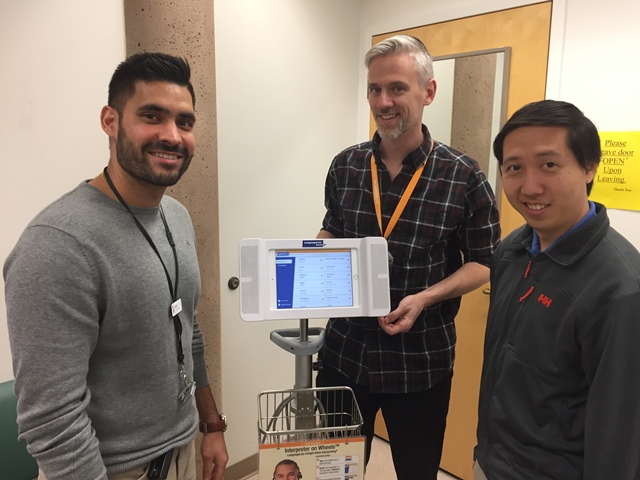By Kris Olsen
As Canada’s third largest and third-most populous province, British Columbia (B.C.) is home to people of many different ethnic origins. According to the Canada 2016 Census, 28 per cent of people in B.C. spoke only one language that wasn’t English or French. Language barriers can cause a number of challenges during a medical appointment, and can lead to frustration for patients and providers, as well as confusion with care plans.
The Provincial Language Service (PLS), a program of Provincial Health Services Authority, provides interpreting and translation services to BC health authorities and private physician offices. In 2019 it received 164,914 requests for interpreting services. In one year, that works out to roughly 451 requests a day! 93 per cent of those requests came from entities in the Lower Mainland.
A project to test virtual interpreting technology
With a goal to ease frustration and ensure patients have a good understanding of their care plans, PLS collaborated with the Office of Virtual Health (OVH) to launch a Video Remote Interpreting (VRI) project at BC Cancer-Vancouver in December. A tablet mounted on an adjustable rolling stand enables clinicians and patients to speak with an interpreter on a live video call during a medical appointment. The service provides access to 40 languages using the video feature and 240 languages through audio.
The project is testing virtual interpreting technology with the potential of adoption on a permanent basis. A collaboration with PHSA’s PLS, the Office of Virtual Health, Vancouver Coastal Health and Fraser Health, the project aims to provide better access to care by improving the timeliness of interpreting services and enhance communication between clinicians and their patients who have a language barrier.
Spurred by positive feedback from patients and clinicians, the VRI project is now being expanded to additional locations across the Lower Mainland. “We are committed to ensuring language isn’t a barrier to receiving access to care, and in that spirit we are thrilled to provide this service at more clinics in Fraser Health, Vancouver Coastal Health and PHSA,” says Kiran Malli, director of PLS.

One of the recent clinics to introduce VRI is the Radiation Therapy Clinic at BC Cancer-Surrey. As chief radiation therapist at BC Cancer-Surrey, Craig Elith works directly with patients who have challenges with English. “I think it’s great to see a simple to use, everyday communication tool be adapted in the health care setting,” says Craig. “I expect the interpreting device to have a positive impact on the patient care experience of non-English speaking patients. All staff had a positive response to the device during the introduction and education sessions. The Radiation Therapy staff are genuinely excited to start using it.”
Look for VRI at the following locations
PHSA
- BC Cancer – Vancouver – Dentistry
- BC Cancer – Surrey – Radiation Therapy Clinic
- BC Cancer – Surrey – Pharmacy Consult
- BC Cancer – Surrey – Patient Review
Fraser Health
- Surrey Memorial Hospital – Family Birthing Unit
- Surrey Memorial Hospital – High Acuity Unit and Intensive Care Unit
Vancouver Coastal Health
- VGH Geriatric Inpatient Unit
- VGH Cardiac Cath lab
- VGH Emergency Department
Project is a collaboration across health authorities
The VRI service is provided through a project that is testing virtual interpreting technology with the potential of adoption on a permanent basis. A collaboration with PHSA’s Provincial Language Service, the Office of Virtual Health, Vancouver Coastal Health and Fraser Health, the project aims to provide the patient with better access to care by improving the timeliness of interpreting services and enhance communication between clinicians and their patients who have a language barrier.
The Office of Virtual Health leads and provides strategic direction for the overall Virtual Health initiative across PHSA. The Provincial Language Service provides interpreting and translation services to BC health authorities and private physician offices. The video remote interpreter augments PLS’ other interpreter offerings, which include in-person and over-the-phone interpreting.
Kris Olsen is a Communications Officer at the Office of Virtual Health.




